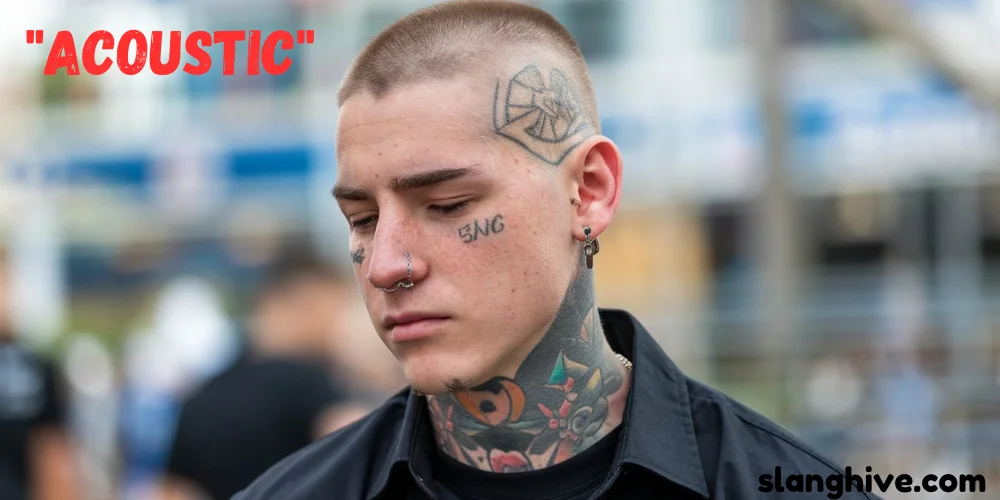
What Does “Acoustic” Mean Slang?: A Hidden Code or Harmful Trend?
Language constantly evolves, shaping the way we communicate both online and offline. One surprising example is the slang use of “acoustic,” which has taken on a controversial meaning in digital spaces like TikTok and X (formerly Twitter).
While “acoustic” traditionally refers to sound and hearing, internet users have twisted it into a euphemism for “autistic,” often in a mocking or derogatory way.
This slang usage, which surfaced around 2016, is believed to be part of “algospeak”—coded language designed to bypass platform filters. However, it has sparked debates due to its ableist implications, with many calling it harmful to the autism community.
In this article, we’ll break down the origins, cultural significance, and controversy surrounding “acoustic” in slang, while also exploring respectful alternatives for everyday conversations.
Key Points
- Research suggests: “acoustic” in slang means “autistic,” used pejoratively to mock unusual behavior, especially on TikTok and X, with origins dating back to 2016.
- It seems likely that “acoustic” is part of algospeak, a way to evade platform filters, but it’s controversial due to its ableist implications.
- The evidence leans toward “acoustic” being harmful to the autism community, with some pushback online for perpetuating stigma.
“Acoustic” Slang Meaning
In slang, “acoustic” is used as a euphemism for “autistic,” implying someone is behaving in a way that’s seen as abnormal or stupid. This usage is offensive, as it misrepresents autism, a neurodevelopmental condition affecting communication and social interaction, and can perpetuate stigma.
“Acoustic” Literal Meaning
The literal meaning of “acoustic” relates to sound, hearing, or the science of sound. For example, an acoustic guitar produces sound without electrical amplification, and acoustics can refer to how sound behaves in a room, like in concert halls.
“Acoustic” Cultural Significance
“Acoustic” in slang reflects how online communities create coded language for humor, often on TikTok and X, but it’s controversial for mocking people with autism. This usage, dating to 2016, has sparked debates about its impact, with some pushing back for its harm to the autism community.
Alternatives and Well Wishes
Given its offensiveness, here are alternatives for different contexts, focusing on respectful communication and expressing well wishes:
- Polite: Say “They seem a bit nervous” instead of “acoustic,” and for well wishes, “I hope you’re doing well today.”
- Professional: Focus on behavior, like “I noticed some challenges with communication; let’s find support,” and wish well with “Wishing you success in your projects.”
- Casual: Use “That’s not cool” to discourage mockery, and for well wishes, “Hope you’re having a great day!”
Choose based on tone: polite for formal, professional for work, casual for friends, ensuring empathy and inclusivity.
Comprehensive Analysis of “Acoustic” in Slang
This note provides a detailed exploration of the slang term “acoustic,” its literal and cultural meanings, and alternatives across different contexts, expanding on the key points for a thorough understanding. The analysis is informed by recent online sources, reflecting usage as of March 16, 2025.
The Slang Meaning of “Acoustic”
In slang, “acoustic” is used as a euphemism for “autistic,” implying someone is behaving in a way that’s seen as abnormal or stupid. Key details include:
- Definition: A derogatory term, part of algospeak, used to evade platform filters, meaning “autistic” but with negative intent. It’s used to mock or belittle, implying mental disability.
- Origins: Dates back to 2016, with early definitions describing it as a mispronunciation of “autistic,” used for “ridiculously stupid or ignorant” behavior, gaining traction in memes like a photoshopped baby-face guitar asking, “What if your child was born acoustic?”
- Usage: Common on TikTok and X, with comments like “Is He Acoustic?” in a pejorative tone, referencing the “Is He Stupid?” meme. Examples include, “Friend: Did you see that guy dancing? He’s so acoustic,” implying mockery.
- Impact: Offensive, as it misrepresents autism, a neurodevelopmental condition affecting communication and social interaction, perpetuating stigma.
This multiplicity of meanings makes “acoustic” a controversial term, depending on context, and often ambiguous without additional clues, reflecting its colloquial and dynamic nature in digital communication.
Literal Meaning of “Acoustic”
In its literal sense, “acoustic” relates to sound, hearing, or the science of sound. Key details include:
- Definition: Derived from the Greek “akoustikos,” meaning “of or for hearing,”. It can refer to the study of sound (acoustics), instruments like acoustic guitars that produce sound without amplification, or the properties of sound in a space.
- Examples: An acoustic guitar is unamplified, relying on string vibration and body resonance, and concert halls are designed with good acoustics for clear sound.
- Usage: Common in music and engineering, contrasting with electric instruments, highlighting its technical, non-slang context.
This literal usage contrasts sharply with its slang interpretation, highlighting the evolution of language in digital spaces.
Cultural Significance of “Acoustic”
“Acoustic” holds cultural significance within internet and Gen Z communities, reflecting humor and coded language, but also controversy. Key aspects include:
- Origin and Evolution: Emerged in 2016, with memes like the baby-face guitar, gaining prominence by 2023 on TikTok and X. It’s part of algospeak, used to discuss sensitive topics without direct violation.
- Digital Usage: Prevalent in comment sections, with trends like “Is He Acoustic?” mocking behaviour, reflecting community norms. It’s used in videos of unusual actions, with captions like “acoustic behaviour,” highlighting irony.
- Community and Controversy: Sparked pushback, with users like @lessshatemorelove on TikTok criticizing its harm to the autism community, claiming it makes light of debilitating effects. Discussions on X posts reflect debates about ableism, with some advocating for empathy.
This cultural shift reflects how slang evolves in digital communities, often drawing from medical terms for humor, but also highlighting tensions around disability stigma.
Alternatives to “Acoustic” in Different Contexts
Given the offensive nature of “acoustic,” alternatives vary by tone and setting, providing nuanced ways to express similar ideas respectfully. Below is a detailed breakdown, with examples, focusing on commenting on behavior and expressing well wishes:
| Context | Alternative | Description | Example Usage |
| Polite | They seem a bit nervous | Respectful, indicating unusual behavior, subtle. | “They seem a bit nervous; maybe they’re just shy.” |
| Polite | I hope you’re doing well | Polite well wish, neutral, for formal settings. | “I hope you’re doing well today.” |
| Polite | Maybe they need help | Gentle way to suggest support, courteous. | “Maybe they need help with social interactions.” |
| Professional | I noticed communication challenges | Formal, clear, for work settings, focusing on behavior. | “I noticed some challenges with team communication; let’s find support.” |
| Professional | Wishing you success | Professional well wish, for colleagues, formal tone. | “Wishing you success in your projects.” |
| Professional | Let’s provide training | Direct, emphasizing support, professional. | “Let’s provide training to improve collaboration.” |
| Casual | That’s not cool | Informal, for friends, discouraging mockery. | “That’s not cool; don’t make fun of people like that.” |
| Casual | Hope you’re having a great day | Casual well wish, playful, for peers. | “Hope you’re having a great day!” |
| Casual | They’re a bit off | Light-hearted, for minor unusual behavior, casual. | “They’re a bit off today, but maybe they’re tired.” |
These alternatives ensure respectful communication, avoiding potential offense or misunderstanding associated with “acoustic,” especially in professional or sensitive settings.
Texting Examples for User-Friendly Communication
- “Friend: Did you see that guy dancing? He’s a bit off, but maybe he’s just having fun.”
- “Colleague: Our new coworker is quiet. Maybe he’s introverted or needs time to warm up.”
- “Family Member: My child struggles making friends. Maybe he needs social skills training.”
- “I don’t get what you’re saying. Could you explain that again?”
- “Hey, I noticed you’re having trouble with that task. Would you like some assistance?”
- “I think we can all do better by being more inclusive and understanding.”
- “I heard someone use ‘acoustic’ wrongly. That’s not okay; it’s disrespectful to people with autism.”
- “It must be challenging to deal with that. How can I support you?”
- “Let’s use language that builds people up, not tears them down.”
- “Actually, autism isn’t about being weird; it’s a different way of experiencing the world.”
- “Everyone has unique strengths. Let’s celebrate our differences.”
- “Neurodiversity is real, and we should embrace it in our community.”
- “It’s important not to stereotype people based on behavior.”
- “Remember, kindness can make a big difference in someone’s day.”
- “Bullying, whether online or in person, is never acceptable. Let’s stand up for others.”
Conclusion
This analysis shows “acoustic” as a dynamic slang term, rooted in digital culture, with clear alternatives for various contexts. Understanding these nuances enhances communication, whether in polite, professional, or casual settings, reflecting the evolving nature of language in 2025, especially on platforms like TikTok.


